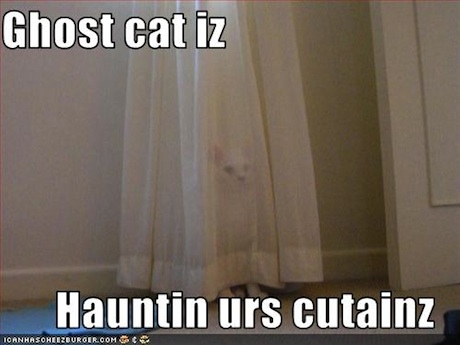Nature is a Haunted House—but Art—a House that tries to be haunted
Inspired by Daisy Fried’s “Questions I Don’t Understand,” I have decided to write the first (and probably only) installment of a series I will call “Metaphors I Don’t Understand.”
Sometimes, when I meet new people, they ask a bunch of questions, including “What do you do?” and “Are you married?” and “Got any kids?” (Does this happen everywhere? Is it the Midwest? Is it me? Anyway.) Sometimes when I answer that I’m a writer, and that I’m married but don’t have kids, they say something like “Oh, but that’s great, because your books are like your kids!”
And mostly because it’s not worth getting into it with people who are just trying to be friendly, I agree and say “Yep, it’s great! Thanks!”
But your books aren’t really like your kids at all. They’re not a substitute for kids, nor are they even comparable, of course, in their means of creation or subsequent care. But even if you don’t take the comparison literally, kids are not a satisfying metaphor, either, for all kinds of reasons. Theoretically, books outlive you like kids do (one hopes, barring tragedy), but your kids eventually die, too. No matter how bright or gloomy your view of the Future of Literature, you can’t dispute that even though your books might eventually “die,” they’re not one hundred percent guaranteed to do so, like human children are. In any event, for a while I was trying to think of a better comparison, but I couldn’t come up with one.
Then, while reading Christian Hawkey’s outstanding cross-genre book Ventrakl last fall, a replacement metaphor fell into my lap: Books are vaguely like your kids, but they are almost exactly like your ghosts. As Hawkey writes, “Books—of the living or the dead—are the truest ghosts among us, the immaterial made material.”
So there you have it: a much better metaphor. Unlike kids, books don’t grow or change as they “age;” they remain the same. They might not go on forever being visible to everyone, but they might “haunt” a few who end up being your readers/ghost-spotters (“hang[ing] around shelves,” being “passed on to friends, or sold to used bookstores” as Kenneth Goldsmith describes). Also, if a book is your “kid,” then that makes you its “parent,” which suggests at least a degree of control, whereas I feel very little power over what happens (or does not) to my books after the initial celebratory flurry that accompanies their “release.” Unlike a baby, a book instantly goes where—and does what—it wants. And sure, the book’s “freedom” is limited in that it is playing out the script I’ve written for it, but as for how it’s going to be perceived when I’m not there? No telling. But the uncertainty is exciting; that release is a relief and a thrill: Who will see this? Where will it go? And I imagine the “release” of a kid (when it learns to drive, starts hanging with questionable friends, goes to college, etc.) is potentially more fraught with a negative kind of anxiety. Since your book is always already dead—already a ghost—you don’t have to fret over it dying, but can immediately begin to fantasize about whose house it will sneak into, whom it will speak to, whom it will keep from sleeping at night.
What do you think, Harriet bloggers and readers? Are your books your ghosts? Do you think of them as your kids? Do you think of yourself in relation to your books in any kind of figurative way at all?
Kathleen Rooney is a founding editor of Rose Metal Press, a publisher of literary work in hybrid genres...
Read Full Biography


